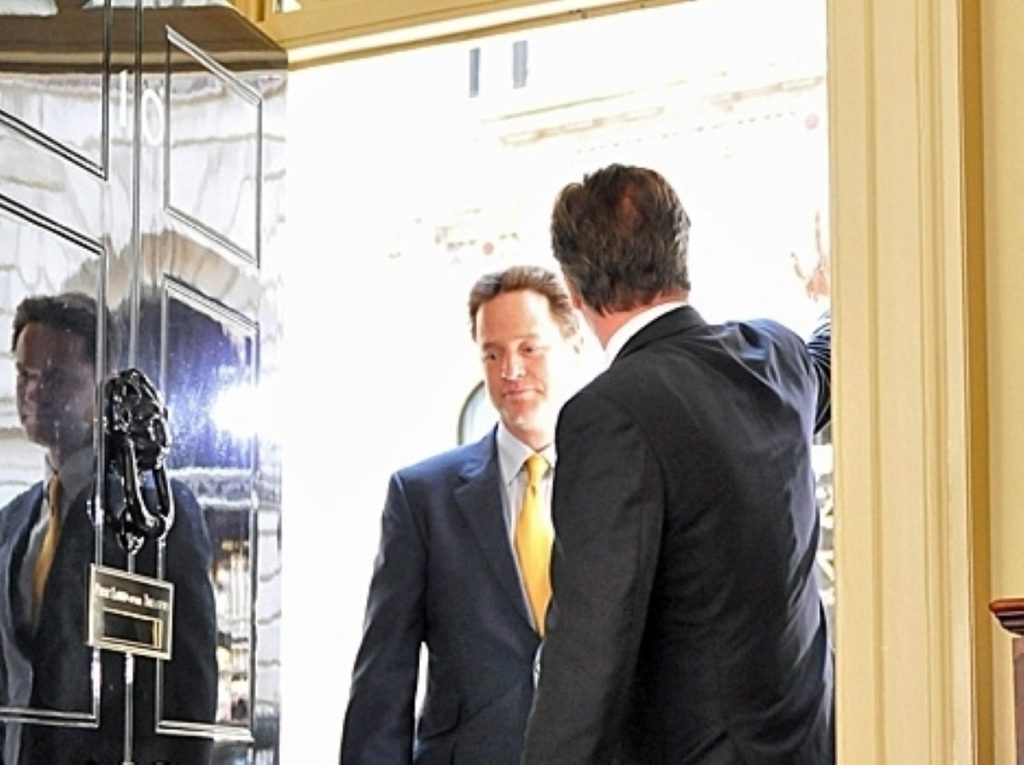Analysis: Cameron’s welfare crackdown is beginning of the end for the coalition
Cameron's welfare speech marks the beginning of the end for the coalition. But it could help extend its life as well.
This is, at least, the beginning of the endgame. The Conservative leader's speculation about what his party might do in government after 2015 begins a process which will dominate the run-up to the next general election.
'Policy differentiation', as the academics call it, is a subject which until now has troubled the Liberal Democrats more than the Tories. That's because the Lib Dems are seen as getting a rawer deal from the coalition than their senior partners.
Now that is changing. Cameron's first overt move to distinguish himself from the Liberal Democrats shows that his mind's focus is now no longer solely on keeping the coalition intact. He has more than one eye on what lies ahead – and is modifying his behaviour in 2012 as a result.


The prime minister's subject matter is no coincidence. Benefits is one of those touchstone issues that fires up the Tory right, which has been unusually volatile in recent weeks.
Underlying tensions have been escalated by the Lib Dems' refusal to support Cabinet minister Jeremy Hunt in a Commons vote earlier this month. Since then backbench MPs have begun talking about walking away from the Lib Dems altogether before 2015.
The dynamics which influence the behaviour of Tory MPs are complex. Even factors such as the size of their majority can have an influence on how pragmatic a view they'll take of the coalition. What their collective anger at the Hunt abstention shows, though, is that they tend to be much more easily influenced by short-term politicking than their leader might like. They are letting emotions get the better of them: understandable, but awkward for the prime minister.
Analysts say it's in the interests of the Tories to kill the Lib Dems with kindness, to play the long game by giving them policy sops. This will help the coalition survive. But it could also help in a post-2015 hung parliament scenario. Just as bad blood between Gordon Brown and Nick Clegg effectively stymied the chances of a Lib-Lab pact in May 2010, so coalition disharmony in the run-up to May 2015 could scupper hopes of extending the arrangement after the next election. So it's essential for Cameron to keep his options open.
A germ of an idea gathering momentum among the more frustrated members of his parliamentary party is threatening his agenda. They're thinking the Conservatives could drop down to a confidence and supply agreement in April or June 2014. In this scenario, where the Tories cling on as a minority government until 2015, it's thought the Lib Dems would be damaged far more than the Conservatives. The Tories could look to the Democratic Unionist party's MPs to prop them up, reducing their reliance on the Liberals. The bargaining process for confidence and supply would leave the Lib Dems compromised in the eyes of the public. Were they to jump ship it would appear too blatantly like electioneering.
Tory MPs might like the idea of letting the coalition out of its misery before the next general election, and gaining the satisfaction of punishing the liberals in the process. Cameron has a different perspective. As well as the strategic need to keep his options open, he has invested personal credibility in the project and so will look to keep it alive for as long as possible.
How, then, can the Tory leader resolve this situation? As Cameron's speech today shows he has now realised, it's engaging in a bit of differentiation that will actually help him in this goal.
By providing his anxious right-wing with rhetoric about a welfare crackdown he will calm their nerves – and reduce the intensity of their mutterings to journalists and each other. Cameron starting to talk about life after 2015 might feel like the beginning of the endgame for the coalition – but it could end up extending the life of the present government, too.









